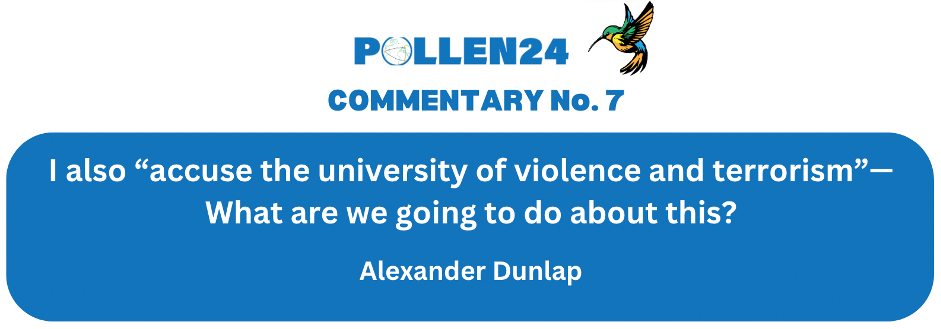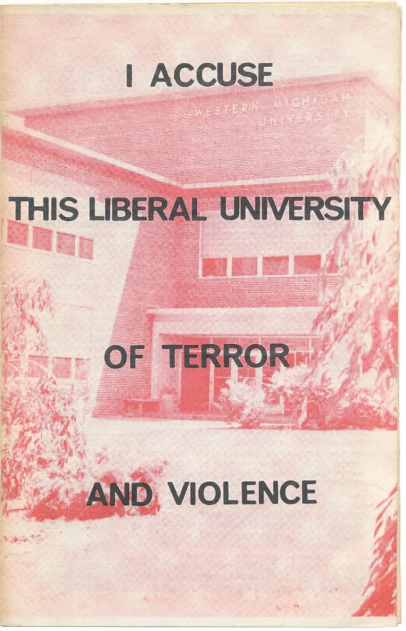2024-05-06
I Also Accuse The “Liberal University of Terror and Violence”— What Are We Going To Do About This Violence?

Abstract
This essay revisits and reinforces Fredy Perlman’s essay’s “I Accuse this Liberal University of Terror and Violence.”
I Also Accuse The “Liberal University of Terror and Violence”— What Are We Going To Do About This Violence?
With an open conversation on the "Just and Plural Political Ecologies: Traditions and Futures,” there is so much to discuss. The structural, political and epistemological violence of academia,[1] as it intertwines with enchanting technologies and addictive habits, boils to the surface. Because the “injustice” or sustained multi-faceted forms of coercion, socioecological degradation and psychological harm are systemic within academia and accepted as a matter of practice is why, following Fredy Perlman (2017[1969]): “I Accuse This Liberal University of Terror and Violence.” This violence is particularly relevant to political ecology as Bridge and colleagues (2015: 8) remind us: “[P]olitical ecology is not merely to understand the world; the point is to change it.” Political ecologist, instead of documenting violence and injustice in faraway lands, has the more challenging obligation to stop this violence where we dedicate so much of our time: The University.
The field of political ecology has rapidly grown, which means so has its disciplinary obligation has as well. Perlman (2017: 26), in the tradition of Veblen (1965 [1918]), shows how universities manufacture an unfound objectivity, which—among other ways—is used as a weapon against politically engaged staff and students. Claims of objectivity creates a liberal consensus that, Perlman (2017: 26) explains, is ultimately dedicated to “the continued functioning of the corporate-military system.” Perlman (2017: 28), criticizing liberal academics as pacifying gatekeeps reminds us:
The Liberal moves WITHIN THE DOMINANT BUREAURCRAYCY: his success comes from PLEASING THE PEOPLE WHO ARE ON TOP. The Liberal (whether professor or student) climbs WITHIN THE HIERARCHY and he wants to do so WITH A GOOD CONSCIENCE. The so-called ‘radical sympathies’ of the liberal are his means to maintain a good conscience while selling himself to those in power (type original).
These words still haunt the university system and, by extension, political ecology.
Perlman’s article is largely about the social construction of what constitute or does not constitute “violence,” and how the academy favors a particular band of structural and political violence that is unleashed against those struggling against war, racism and domination to maintain institutional, but also individual, power, privilege or just working positions within the university. While Perlman’s essay deserves more attention, the reality is not much has changed. The violence, carelessness and competitive academic ‘rat race’ continues while the “the corporate-military system” prevails, entrenching itself, and, as we have seen with Gaza, has unleashed violence against university encampments peacefully protesting a genocidal process.[2] Engaged staff write letters, sign petitions, enroll in bureaucratic struggles and, even, get beaten up by police at their work place with little-to-no avail. The university system must be made to change if it will start meeting its potential in addressing socioecological catastrophe and injustice.

The Cover of Perlman’s text. Source: Black & Red, 1969.
The Violence We Feel, but Ignore
The university should be the place demonstrating socioecological change, serving as a site of experimentation and praxis (see Dunlap et al., 2023). This, however, could not be further from the truth. Beside advancing technologies of digital, political and military control (Chatterjee & Maira, 2014), not to mention genetic dissection and animal vivisection—or some degree of this (Pellow, 2014)—universities fail to enact real examples of socioecological of renewability and sustainability. How come universities are not overflowing with agroecology, permaculture and forest gardens on and inside universities? How come universities are not self-generating their own electricity needs through wind, solar and other lower-carbon infrastructures? We, unfortunately, are witnessing the opposite at university campuses around the world.
Universities are as careless as the rest of industrial societies in their ever-growing appetites for energy, material and economic growth. Among many issues underdiscussed is the hyper-digitalization of classrooms. The proliferation of screens, cameras, microphones and, worse still, a proliferation of digital programs to mediate reading, discussions, activities and grading—Leganto, Canvas (or Blackboard), Inspera, course websites and more!? There are more convivial ways to perform these tasks, which was the norm 30 years ago.
Related, and shockingly, the insights from educational research (see van der Velden, 2020) are ignored within teaching regimes, instead forcing through material, energy and labor intensive (e.g. socioecologically destructive) digital platforms (Dunlap et al., 2023). This is not to forget the scientific (e.g. ontological/epistemological), sexual, gender, racial and other political discriminations are alive and well in various guises within universities (see Dunlap et al., 2021, 2023). It appears, overall, that money and contracts built on extractivism have and continue to dictate everything, meanwhile everyone is prepared to step-on each other and rollover to digitalization, border police and not properly implement resilient, reciprocal and renewing political ecologies that we desperately need. We must critically reflect and work together to change our institutions and our own submission to extractivism, authoritarian impositions, various discriminations and border-immigration regimes to which universities remain rather useless and enforce against their staff and students.
Veblen (1965) and Perlman (2017) warned us. We face the stereotypical combinations of (self-)exploitation, hiring gatekeeping, exhaustion and creating barriers for self-motivated staff and students within institutions that running people down to maintain a perverse and intensifying business as usual. I believe this relates to another structural relational/psychosocial problem celebrated, reinforced and manufactured by universities. This relates to Perlman’s (2017) concern with claims of “objectivity” used as a weapon (see Dunlap et al., 2021, 2023), but how academics forget they are living in this world and are a part of these conflicts. We are taught to view the world through a window or from the view of privileged institutions, neighborhoods and/or countries (see Gelderloos & Dunlap, 2023; Romanyshyn, 1989). When we see the world through a window—presumably a university window—we forget that we are actually apart of this ecosystem, implicated in near various struggles near and far—even if not immediately in many instances and often have the means to leave.
Reproducing the world as our petri dish or looking at the world through the windows of the university, the larger picture is lost and transformed into institutional reformism and token solidarity. One could only speculate why university staff and students are not transforming universities towards real socioecological sustainability, instead promoting corporate publishers (see Batterbury & Silva, 2024) and software companies plunder and mediate the valuable aspects of higher-learning. We, especially senior staff, must do better at struggling within our institutions to create dignified and socioecologically ‘just’ universities that are confronting political/social/economic/ecological crises of our time.
I accuse the Euro-American university system of terror and violence for advancing militarization, exploitative working conditions, digital totalitarianism, anti-educational practices and ethnic, class, gendered, political and epistemological discriminations. This, of course, combines with university rectors and managers inviting state violence and repression against staff, students and the general public at University encampments across Euro-America. The state of universities, what they do and how political ecologists submit remains a daunting issue for just and plural political ecologies, which haunts our past and stifles our future. If there is any hope in working tactically and strategically to break extractive corporate-military complex, then it will be political ecologists who must really begin this transformation.
Notes
[1] For discussion on the morally loaded term “violence,” see Gelderloos (2013).
[2] If you have not already, read Perlman’s (1983) “Anti-Semitism and the Beirut Pogrom.”
References
Batterbury, Simon, and Diego Silva. 2024. “Publishing in Political Ecology: Rethinking Unequal Relationships and Social Justice.” JPE Grassroots. https://www.grassrootsjpe.org/view/resource.php?resource=10.
Chatterjee, Piya, and Sunaina Maira. 2014. The Imperial University: Academic Repression and Scholarly Dissent. Minneapolis: University of Minnesota Press.
Dunlap, Alexander, Alejandro Ruelas, & Lisa Hammelbo Søyland, eds. 2023. Debates in Post-Development and Degrowth: Volume 2. Oslo: Tvergastein. https://www.tvergastein.com/s/Degrowth-Volume-2.pdf.
Dunlap, Alexander, Lisa Hammelbo Søyland, & Shayan Shokrgozar, eds. 2021. Debates in Post-Development and Degrowth: Volume 1. Oslo: Tvergastein. https://drive.google.com/file/d/1-7_m7B1BJhB2rPIv6rw3Go7VZtyHN5Zz/view.
Gelderloos, Peter. 2013. The Failure of Nonviolence: From Arab Spring to Occupy. Seattle: Left Bank Books.
Gelderloos, Peter, and Alexander Dunlap. 2023. “‘The Poisons Are Already in Here with Us:’ Framing for Ecological Revolutions from Below.” Globalizations: 1–18.
Pellow, David Naguib. 2014. Total Liberation: The Power and Promise of Animal Rights and the Radical Earth Movement. Minneapolis: University of Minnesota Press.
Perlman, Fredy. 2017 [1969]. “I Accuse This Liberal University of Terror and Violence.” In Anything Can Happen:, 23–35. Salem: Black and Green Press.
Perlman, Fredy. 1983. “Anti-Semitism and the Beirut Pogrom.” Black & Red Press. The Anarchist Library. https://theanarchistlibrary.org/library/fredy-perlman-anti-semitism-and-the-beirut-pogrom.
Perreault, Tom, Gavin Bridge, and James McCarthy. 2015. The Routledge Handbook of Political Ecology. London: Routledge.
Romanyshyn, Robert. 1989. Technology as Symptom and Dream. London: Routledge.
van der Velden, Maja. 2020. “‘I Felt a New Connection between My Fingers and Brain’: A Thematic Analysis of Student Reflections on the Use of Pen and Paper during Lectures.” Teaching in Higher Education, 1–18.
Veblen, Thorstein. 1965. The Higher Learning In America: A Memorandum on the Conduct Of Universities By Business Men. New York: Sentry Press.
